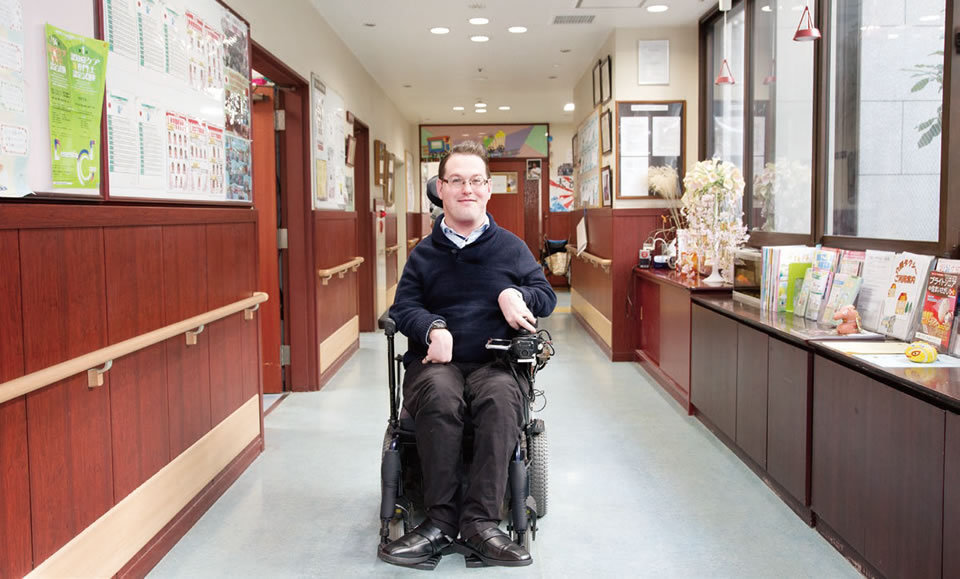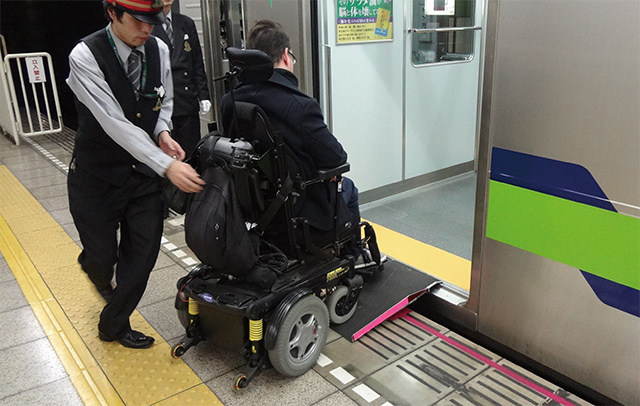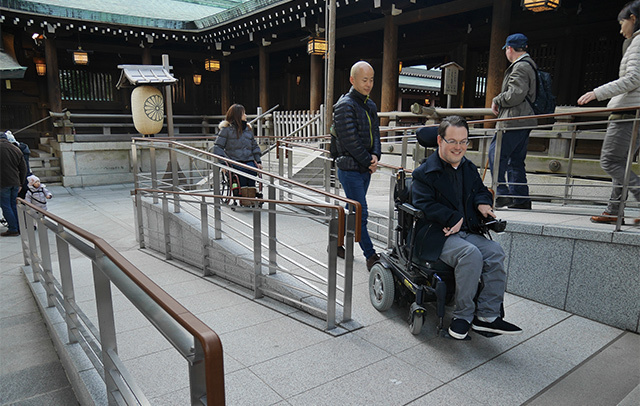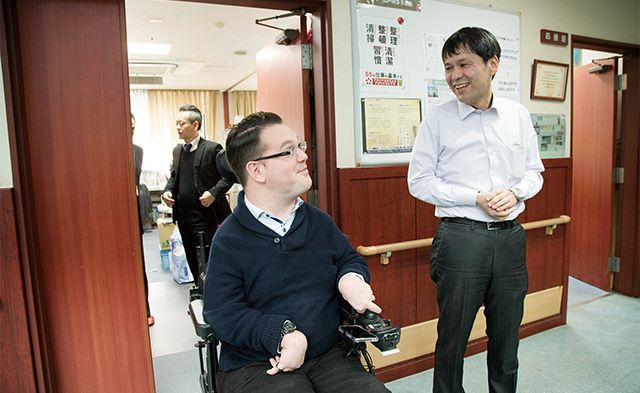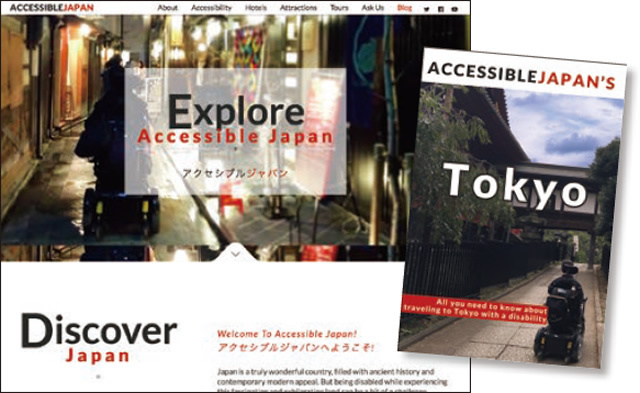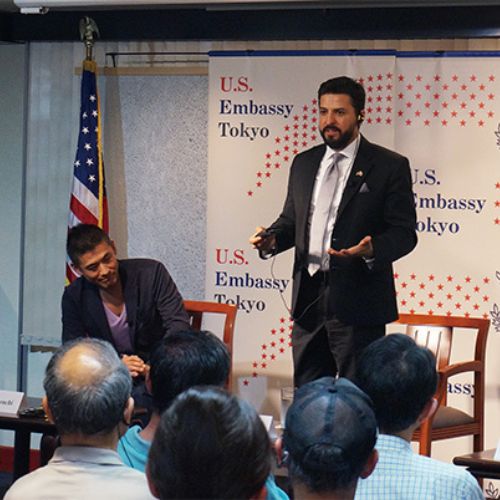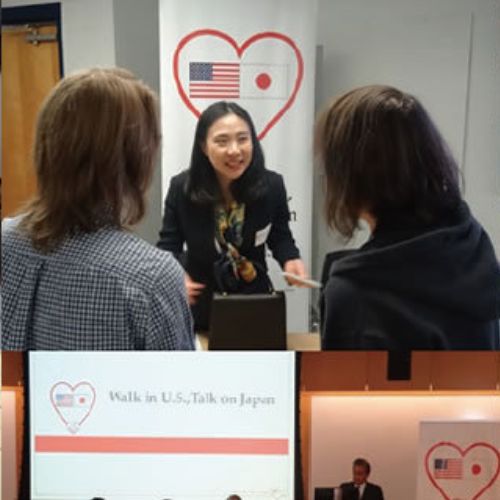Can disabled guests to the Tokyo 2020 Olympic and Paralympic Games expect to find Japan accessible? Josh Grisdale, creator of the website Accessible Japan and a 10-year resident of Japan answers a resounding “yes.”
Canadian-born Grisdale, a quadriplegic, was diagnosed with cerebral palsy when he was six months old. From the age of three, he used an electric wheelchair. Disability did not stop the ambitious boy from working hard and getting top grades in school.
Taking Japanese in high school sparked in Grisdale the desire to see Japan firsthand. In 2000, he came to Tokyo with his father for one month as a high school graduation present. Accessibility in Japan exceeded his expectations and the spirit of omotenashi (hospitality) impressed him deeply. After visiting Sensoji Temple in Asakusa, he remembers looking for an elevator to take him to the subway platform. The elevator had yet to be built, but six station attendants carried him and his 130-kilogram wheelchair down the flights of stairs. This eagerness to serve the customer, along with Japan’s appealing mix of the traditional and modern planted in Grisdale the dream of one day making Japan his home.
Significant for Grisdale and other disabled people, in this same year, 2000, Japan enacted the Transportation Accessibility Improvement Law, committing the society to becoming “barrier-free.” Grisdale returned to Japan in the years that followed, each time impressed by the accessibility improvement. He felt that everyone, not just the government, was working together for this goal.
In 2007, Grisdale moved permanently to Tokyo. He has a full-time job managing social welfare institution websites. In addition, working in his spare time, he launched his own website, Accessible Japan, in 2015. “I started the website because of the limited information on accessibility in Japan in English. I don’t want people to give up their dream of visiting Japan because they think it’s not accessible.” Grisdale’s efforts have touched lives. For example, an Australian father and his daughter with cerebral palsy, bonded by their shared love of anime, decided to come to Japan because of the information on Accessible Japan.
Friends of Japan
Making Japan Accessible to All
Grisdale in his barrier-free workplace. He calls barrier-free design an investment that benefits all, including the elderly as well as people with disabilities.
Josh Grisdale
Born in Canada, and has lived in Tokyo since 2007. Manages the websites for a group that runs nursing homes, retirement homes, kindergartens, and nursery schools. In his spare time, he works on Accessible Japan, his website that provides accessibility information in English for disabled people visiting Japan. Josh has cerebral palsy, is quadriplegic, and has used a wheelchair since the age of three. He became a Japanese citizen in 2016.
Implementation of the Transportation Accessibility Improvement Law has resulted in 92.8% of train stations and 92.6% of city buses in Tokyo being equipped with step-eliminating devices as of March 2017.
Checking Meiji Shrine for accessibility. Grisdale visits sightseeing spots on weekends and posts reviews on Accessible Japan.
In daily life and on weekend excursions, Grisdale can observe Japan’s progress toward accessibility. After visiting Meiji Shrine, for example, he wrote in a review that the gravel paths were difficult for wheelchairs to navigate. He returned two months later to find that ramps and a pathway down the main route had already been added.
Seeing everyone work together to make the Tokyo 2020 Olympic and Paralympic Games accessible excites Grisdale, as does the aim of welcoming the highest ever number of participating countries and regions to the Tokyo Paralympics. Grisdale envisions Tokyo becoming a city that is open to everyone, and looks forward to seeing more buildings with entrance ramps, accessible platforms at stations, and an increased number and variety of accessible hotel rooms. With Japan a leader in robotics and barrier-free design in Asia, he feels confident that challenges will be overcome as Japan boosts efforts to make stations, airports and other facilities barrier-free by 2020. Grisdale seeks to do his part by providing up-to-date and deeper-level information on accessibility in English. He visits sites, searches websites, and makes calls so he can inform others with disabilities of the location of elevators and restrooms, the accessibility of tourist sites and restaurants, and other important details. He wants each disabled visitor to enjoy Japan in safety and comfort.
Grisdale reflects, “Coming to Japan actually meant a lot of freedom for me. My dream now is that more and more people find Japan accessible and exhilarating as I have.” Towards that end, Grisdale and Accessible Japan are paving the way for other people to realize their dream of visiting Japan.

























